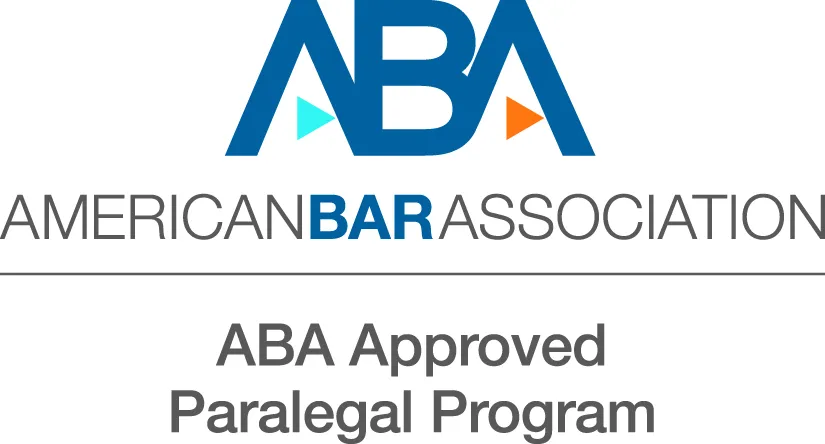
Paralegal Specialist Certificate
Online
Complete your studies on your own time
Finish in 8 months
Average completion time
Year-round enrollment
Our admissions team reviews applications year-round

Take the first step in your National University Journey

Dot the I’s and Cross the T’s on a Paralegal Career.
Certificate:
Paralegal Specialist Certificate
Application:
$0 application fee. No essays/exams.
Behind every successful lawyer is a highly organized paralegal specialist with the relevant knowledge and skills to keep things operating smoothly. If you’re fascinated by the American judicial system and want to play an integral role in it, National University’s Paralegal Specialist Certificate can help you prepare for an exciting, in-demand career.
Depending on your specific area of interest, NU offers you a choice of three certificates focusing on corporate law, criminal law, or litigation. No matter which path you choose, you’ll learn a variety of skills, from conducting research and investigating the facts of a case to writing or summarizing reports to help lawyers prepare for transactions or trials.
Each certificate is tailored to include training in substantive legal analysis, drafting legal documents, and understanding procedural matters. This program is approved by the American Bar Association and offered online.
Paralegals may not provide legal services directly to the public, except as permitted by law. Students must take at least nine semester credits or the equivalent of legal specialty courses through synchronous instruction.
Accreditations

The Western Association of Schools and Colleges (WASC) accredits public and private schools, colleges, and universities in the U.S.

Certificate Requirements
This program option requires the completion of 90 quarter units of coursework. It includes 8 courses, all of which are legal specialty courses. Please note that a minimum of 27 quarter units of general education course work (across at least three disciplines, such as social science, natural science, mathematics, humanities, foreign language, and English) are required by the American Bar Association (taken from Catalog).
National University awards credit in quarter units, with each academic year divided into four 12-week quarters.
Each quarter is made up of three 4-week classes, with one class per month. Under the current policy, 4.5 units of credit are awarded for courses.
PRogram Requirements
8 Courses
Torts
4.5 Quarter Units
Examines the fundamental principles of the law of intentional torts (e.g., battery, assault, false imprisonment, intentional infliction of emotional distress); negligence (standard of care, breach of duty, causation, damages); strict liability; the torts of nuisance, defamation, invasion of privacy torts; and the defenses to each of these torts. Also addresses the concepts of products liability and vicarious liability.Examines the fundamental principles of the law of intentional torts (e.g., battery, assault, false imprisonment, intentional infliction of emotional distress); negligence (standard of care, breach of duty, causation, damages); strict liability; the torts of nuisance, defamation, invasion of privacy torts; and the defenses to each of these torts. Also addresses the concepts of products liability and vicarious liability.
Leg Res Wrtg-Briefing/Analysis
4.5 Quarter Units
Develops legal research skills through focused exercises using print and computerized research. Exposes students to primary and secondary legal authorities, with an emphasis on constitutions and statutes. Develops writing skills by analyzing and briefing court opinions, drafting letters, and examining the purposes and uses of a legal memorandum.
Contracts
4.5 Quarter Units
Examines basic contract principles, including formation, validity, defenses to formation, rights of third parties, performance, breach, remedies, and damages. Emphasizes case analysis and application of principles, and covers code sections from Article 2 of the Uniform Commercial Code and the Restatement Second of Contracts.
Leg Res Wrtg-Legal Memo
4.5 Quarter Units
Develops legal research skills through focused exercises using print and computerized research. Exposes students to primary and secondary legal authorities, with an emphasis on legislative history, administrative materials, and loose-leaf services. Develops writing skills by examining different parts of the legal memorandum, including questions presented, brief answers, statements of fact. And conclusions.
Computers & The Law
4.5 Quarter Units
Teaches computer technology as a tool to assist the legal professional in the practice of law. Utilizes lectures, group discussion, and hands-on computer use. Using the latest software for time and billing, case management docketing, control, and litigation support, students complete legal projects with assignments in the computer lab. Students learn how to effectively evaluate vendor products, and design and manage a litigation database project. Also covered are telecommunications and computer-assisted research, and ethical concentrations, such as software piracy, misuse of software and databases, security, and protecting client data.
Foundations of Property Law
4.5 Quarter Units
Examines real property law, including interests in land, landlord/tenant easements and conveyances.
Legal Writing Project
4.5 Quarter Units
The course allows students the opportunity to prepare a legal writing work product using both print and online legal resources.
Paralegals may not provide legal services directly to the public, except as permitted by law. Students must take at least nine semester credits or the equivalent of legal specialty courses through synchronous instruction.
Specializations
Corporations
Essentials of Corporate Law
4.5 Quarter Units
Examines the formation, operation, and dissolution of various types of corporate entities. Introduces students to common corporate documents, securities, and mergers and acquisitions.
Criminal Law
Essentials of Criminal Law
4.5 Quarter Units
Covers criminal law and procedure, including crimes and their defenses, constitutional protections, and criminal litigation practice.
Litigation
Litigation Essentials
4.5 Quarter Units
Covers civil procedure in both state and federal courts and civil litigation strategies. Emphasizes the paralegal’s role in discovery, pre-trial, and trial proceedings. Includes discussion of various forms of discovers, such as depositions, interrogatories, and demands for production of documents, and introduces judgments and the appellate process.
Career Outlook
Here are some careers this certificate could prepare you for:
- Top Jobs in this field
- Median Salary (USA)
- JOB Openings (USA)
- Paralegals and Legal Assistants
- $60,438 avg. salary (USA)
- 41,898 job openings (past yr.) past year
Most desired skills
- Lawsuits
- Legal Pleadings
- Legal Discovery
- Legal Research
- Legal Depositions
- Legal Hearings
- Proofreading
Top companies hiring for this role
- Contact Government Services
- US Foods Holding
- Morgan & Morgan, P.A.
- United States Department of Justice
- State of Florida
- DLA Piper
- State Farm
Program Learning Outcomes
Learn the key skills to help you excel in your field of study.
- Discuss broad legal principles from the primary areas of law, and explain the definitions of certain basic legal terms and phrases.
- Conduct legal research using manual and computer-assisted methods.
- Demonstrate the basic process of legal reasoning and analysis.
- Describe the paralegal’s role in law practice.
- Recognize how broad ethical principles apply to paralegals in law practice.

Admissions
Transfer Students Welcome
Enrolling in a university is a big decision. That’s why our dedicated admissions team is here to guide you through the admissions process and help you find the right program for you and your career goals.
To that end, we’ve simplified and streamlined our application process, so you can get enrolled in your program right away. Because we accept and review applications year round, you can begin class as soon as next month, depending on your program and location of choice.
Learn more about undergraduate, graduate, military, and international student admissions, plus admissions information for transfer students. You can also learn more about our tuition rates and financial aid opportunities.
To speak with our admissions team, call (855) 355-6288 or request information and an advisor will contact you shortly. If you’re ready to apply, simply start your application today.

Scholarships and Financial Aid
National University is dedicated to making higher education affordable, as well as accessible. Through NU scholarship offerings, eligible students are able to reduce the financial burden of college, start classes sooner, and finish their programs faster while focusing on achieving their goals.
Accreditations

The Western Association of Schools and Colleges (WASC) accredits public and private schools, colleges, and universities in the U.S.


Why National University?
We’re proud to be a Veteran-founded, San Diego-based nonprofit. Since 1971, our mission has been to provide accessible, achievable higher education to adult learners.
Today, we educate students from across the U.S. and around the globe, with over 240,000 alumni worldwide.

“National University has impacted my career. You can immediately apply what you learn in class to your business.”
Francisco R.,
Class of 2016
What makes a degree
with National University unique?
Free Tutoring Sessions
Access personalized tutoring sessions at no cost — empowering your learning.
Online and In-Person
Flexibility meets quality education with our online and in-person learning options.
24/7 Support
Get assistance anytime, anywhere with our round-the-clock support services.
Military Friendly
Committed to serving those who serve — diverse resources and support for veterans and family. Military and Veteran Admissions.
Mentoring Network
Individual student and alumni career guidance, professional development opportunities, and customized career support.
Transfer Students Welcome
NU makes it easy to get your degree, even if you started it with another university. Learn more about transferring to NU.
Accelerate Your Career With NU
At National University, you’re part of a family. As a student, you’ll have the support of staff, faculty members, students, and alumni who will be there with you every step of the way, cheering you on as you pursue your goals.
Our network of 240,000 alumni is a large global community that provides our graduates with the professional connections to get a leg up in your new career.

Additional Resources
- Click here for Paralegal Specialist Certificate – Corporations program specific course information.
- Click here for Paralegal Specialist Certificate – Criminal Law program specific course information.
- Click here for Paralegal Specialist Certificate – Litigation program specific course information.
- Meet our Faculty
Program Disclosure
Successful completion and attainment of National University degrees do not lead to automatic or immediate licensure, employment, or certification in any state/country. The University cannot guarantee that any professional organization or business will accept a graduate’s application to sit for any certification, licensure, or related exam for the purpose of professional certification.
Program availability varies by state. Many disciplines, professions, and jobs require disclosure of an individual’s criminal history, and a variety of states require background checks to apply to, or be eligible for, certain certificates, registrations, and licenses. Existence of a criminal history may also subject an individual to denial of an initial application for a certificate, registration, or license and/or result in the revocation or suspension of an existing certificate, registration, or license. Requirements can vary by state, occupation, and/or licensing authority.
NU graduates will be subject to additional requirements on a program, certification/licensure, employment, and state-by-state basis that can include one or more of the following items: internships, practicum experience, additional coursework, exams, tests, drug testing, earning an additional degree, and/or other training/education requirements.
All prospective students are advised to review employment, certification, and/or licensure requirements in their state, and to contact the certification/licensing body of the state and/or country where they intend to obtain certification/licensure to verify that these courses/programs qualify in that state/country, prior to enrolling. Prospective students are also advised to regularly review the state’s/country’s policies and procedures relating to certification/licensure, as those policies are subject to change.
National University degrees do not guarantee employment or salary of any kind. Prospective students are strongly encouraged to review desired job positions to review degrees, education, and/or training required to apply for desired positions. Prospective students should monitor these positions as requirements, salary, and other relevant factors can change over time.
Program Disclosure Information
This program is not intended for students to practice law. The coursework taken in this program is not transferable to law school. Paralegals are not lawyers and are not licensed to practice law. Paralegals may not provide legal services directly to the public, except as permitted by law. Paralegals have a limited scope practice depending on the State. Please check local, state and federal laws as these restrictions vary. Students must take at least nine (9) semester credits or the equivalent of legal specialty courses through synchronous instruction to complete the program or receive a degree.
Back to top